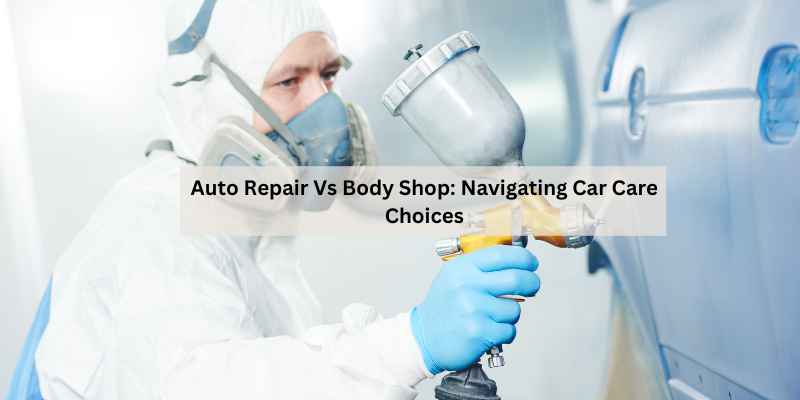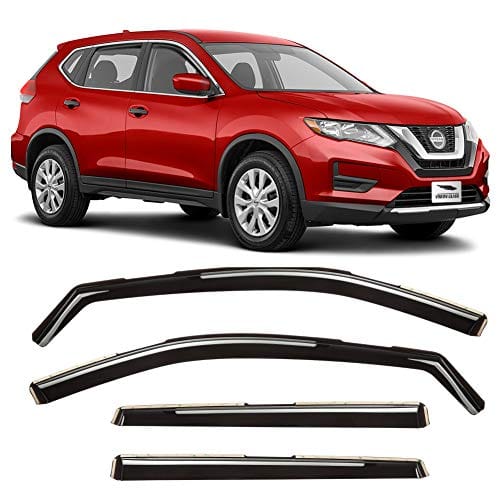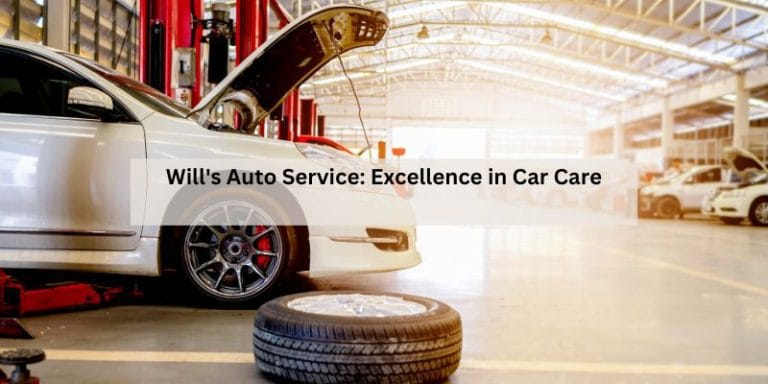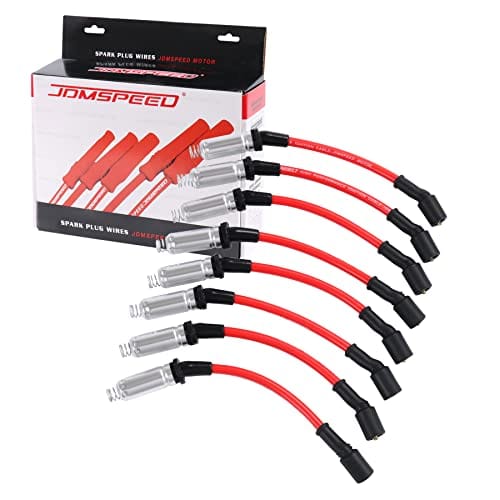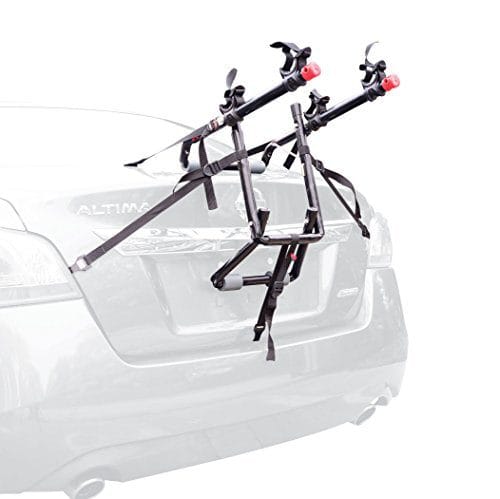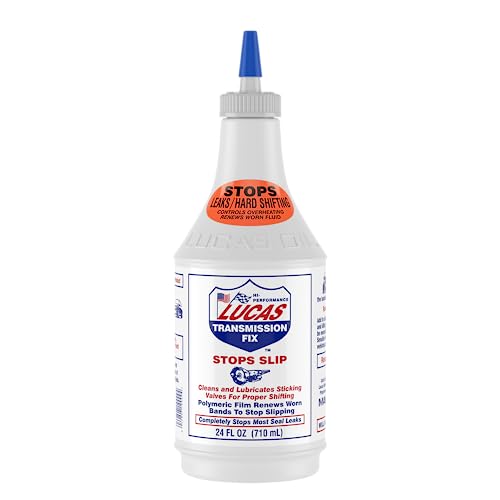Auto Repair Vs Body Shop: Navigating Car Care Choices
Auto repair shops focus on fixing engine components, while body shops repair the vehicle’s exterior parts. Auto repair shops handle mechanical issues, while body shops specialize in cosmetic and structural repairs.
Both types of shops play distinct roles in maintaining and restoring vehicles. When your car has engine problems, you would visit an auto repair shop, but for body damage, a body shop is the place to go. Understanding the differences between these two types of shops can help car owners make informed decisions when it comes to vehicle maintenance and repairs.
Let’s delve deeper into the distinctions between auto repair shops and body shops to better grasp their unique functions and services.
Auto Repair Shops Unveiled
Services Offered
Auto repair shops provide a wide range of services to keep vehicles running smoothly. These services include:
- Engine diagnostics and repair
- Brake system maintenance
- Suspension and steering repairs
- Transmission services
Mechanical Expertise
Auto repair shops boast skilled mechanics with expertise in handling various mechanical issues. They are adept at:
- Identifying engine problems
- Performing tune-ups and oil changes
- Replacing worn-out parts
- Conducting routine maintenance checks
Body Shop Basics
Auto repair shops specialize in fixing engine components, while body shops focus on repairing the vehicle’s body and frame. Body shops handle cosmetic damages like dents and scratches, whereas auto repair shops address mechanical issues for optimal vehicle performance. Both play distinct roles in vehicle maintenance.
Body shops specialize in enhancing the appearance of vehicles through paint jobs, dent removal, and detailing.
They focus on restoring the external beauty of the car, making it look as good as new.
Whether it’s fixing scratches, dents, or repainting the entire vehicle, body shops prioritize aesthetics.
Structural Repairs
Body shops also handle structural repairs that are essential for the safety and integrity of the vehicle.
They work on repairing the frame, doors, windows, bumpers, and other non-mechanical components.
Structural repairs ensure that the vehicle is not only visually appealing but also structurally sound.
Deciding Between Auto Repair And Body Shop
When your vehicle sustains damage, deciding whether to take it to an auto repair shop or a body shop depends on the type of damage and the specialized tools required. Let’s explore the key factors to consider when making this decision.
Type Of Damage
Minor dents, scratches, and paint damage are best addressed at a body shop. These facilities are equipped with the necessary tools and expertise to restore the aesthetic appearance of your vehicle. On the other hand, mechanical issues such as engine problems, transmission repairs, and brake system malfunctions should be taken to an auto repair shop where specialized diagnostic equipment and skilled mechanics are available to handle the repairs.
Specialized Tools Required
Body shops utilize tools like dent pullers, paint sprayers, and frame straightening machines to effectively address cosmetic damages. In contrast, auto repair shops require diagnostic scanners, engine hoists, and specialized wrenches to diagnose and repair mechanical issues. The decision on where to take your vehicle depends on the nature of the damage and the tools necessary to fix it.
Quality And Reliability
When it comes to getting your vehicle fixed, the quality and reliability of the service are of utmost importance. Whether you’re seeking an auto repair shop or a body shop, you want to ensure that the work is done to a high standard and that you can rely on the results. Let’s delve into the key factors to consider when assessing the quality and reliability of these establishments.
Assessing Shop Credentials
Before entrusting your vehicle to any shop, it’s crucial to assess their credentials. Look for certifications and affiliations with reputable organizations such as ASE (National Institute for Automotive Service Excellence) or I-CAR (Inter-Industry Conference on Auto Collision Repair). These credentials signify that the technicians have undergone rigorous training and are equipped to provide top-notch services.
Customer Reviews
Prior to making a decision, take the time to review customer feedback. Seek out testimonials and ratings on platforms like Google, Yelp, and Facebook. Pay attention to recurring themes in the reviews, such as the shop’s attention to detail, timeliness, and customer service. Positive reviews can provide valuable insights into the quality and reliability of the shop’s work.
Cost Considerations
When it comes to vehicle repairs, cost is a major consideration for car owners. Understanding the various expenses and insurance coverage for auto repair and body shop services is essential for making informed decisions.
Estimating Repair Expenses
Estimating the repair expenses for your vehicle depends on the type and extent of damage. Auto repair shops primarily focus on mechanical components such as engines, brakes, and transmissions. The cost of repairs is influenced by the specific parts and labor required, with hourly labor rates varying across different service providers. On the other hand, body shops specialize in repairing and refinishing the vehicle’s exterior, including the frame, doors, windows, and bumpers. The cost of body repairs is determined by the extent of damage and the materials needed for restoration, such as paint, panels, and structural components.
Insurance Coverage
Insurance coverage plays a crucial role in managing repair expenses. When your vehicle is involved in an accident, your insurance policy may cover the costs of both mechanical repairs and bodywork. However, the extent of coverage varies based on your insurance provider and the specific terms of your policy.
Some insurance plans may have limitations on coverage for body repairs or require you to choose from a list of approved repair facilities. It’s important to review your insurance policy to understand the coverage available for auto repairs and bodywork, enabling you to make informed decisions when seeking repairs.
Timeframe For Repairs
When it comes to getting your vehicle back on the road, the timeframe for repairs is a crucial factor to consider. Whether you opt for auto repair services or visit a body shop, understanding the scheduling and turnaround time, as well as the convenience factors, can make a significant difference in your overall experience.
Scheduling And Turnaround
When scheduling repairs at an auto repair shop, the timeframe can vary based on the complexity of the issue, availability of parts, and the workload at the shop. Simple repairs such as oil changes or brake pad replacements may only take a few hours, while more extensive repairs like engine overhauls could take several days to complete.
On the other hand, body shops often handle repairs related to the vehicle’s exterior, such as dents, scratches, and paintwork. Scheduling at a body shop may involve an initial assessment of the damage, followed by ordering necessary parts and scheduling the repair. The turnaround time for body repairs can range from a few days for minor cosmetic fixes to several weeks for extensive bodywork.
Convenience Factors
When considering the convenience of repairs, auto repair shops may offer quick turnaround for routine maintenance and minor repairs, allowing you to get back on the road swiftly. However, for more complex issues, the availability of specialized parts and the workload at the shop can impact the overall timeframe for completion.
Body shops, while specializing in exterior repairs, may take longer due to the intricate nature of cosmetic work. Factors such as the need for custom paint matching and curing times can contribute to extended repair durations. Additionally, coordinating with insurance companies for claims and approvals can also influence the overall convenience of body shop repairs.
Warranty And Follow-up
When choosing between an auto repair shop and a body shop, understanding the warranty offers and post-repair support is crucial to ensure a seamless experience.
Understanding Warranty Offers
Auto repair shops and body shops may offer different warranty terms for their services. It’s essential to inquire about the warranty coverage provided by each shop before proceeding with the repairs.
Post-repair Support
Post-repair support is another critical aspect to consider. A reliable auto repair or body shop should offer follow-up assistance to address any issues that may arise after the repair work is completed.
Finding Trusted Professionals
Trustworthy professionals are key when deciding between an auto repair shop and a body shop. Auto repair focuses on engine components, while body shops handle frame and body repairs. Ensuring quality service from both is essential for your vehicle’s overall maintenance and repair needs.
Research And Recommendations
When seeking trusted professionals for auto repair or body shop services, conducting thorough research is essential. Start by gathering recommendations from family, friends, or online reviews.
Certifications To Look For
When choosing an auto repair or body shop, look for certifications such as ASE (Automotive Service Excellence) or I-CAR (Inter-Industry Conference on Auto Collision Repair) to ensure quality service.
When Repairs Overlap
Auto repairs and body shops are two different types of services. While auto repair shops focus on fixing engine components and related parts, body shops fix the body of the vehicle, such as the frame, doors, windows, and bumpers. It’s important to understand the difference between the two and choose the right type of service for your needs.
Handling Complex Cases
When repairs overlap between auto repair and body shop services, it can lead to complex cases that require a thorough understanding of both mechanical and cosmetic aspects of vehicle maintenance. Addressing these complex cases involves a comprehensive approach to ensure that all necessary repairs are completed effectively.
Coordinating Between Shops
Coordinating between auto repair and body shop facilities is crucial when dealing with overlapping repairs. Effective communication and collaboration between the two shops are essential to ensure that the mechanical and bodywork aspects are aligned seamlessly. This coordination is vital for delivering comprehensive and satisfactory outcomes for vehicle owners.
DIY Versus Professional Care
When it comes to auto repair vs. body shop care, DIY fixes can address minor issues like dents or scratches, while professional body shops handle major collision repairs and paintwork. Both options have their place, depending on the severity of the damage and the skill level of the individual.
Evaluating DIY Capabilities
If you’re the kind of person who enjoys tinkering with cars and has a basic knowledge of how they work, you may be tempted to take on auto repairs yourself. However, it’s important to evaluate your DIY capabilities before attempting any repairs. Consider the complexity of the repair, the tools required, and the risks involved. Some repairs, such as changing oil or replacing a battery, are relatively simple and can be done at home with basic tools. But for more complicated repairs, such as engine overhauls or transmission replacements, it’s best to leave it to the professionals.
Risks Of Self-repair
Attempting auto repairs yourself can also come with some risks. If you’re not familiar with the proper procedures or don’t have the right tools, you could end up causing more damage to your vehicle or even injuring yourself. In addition, DIY repairs can void your warranty or insurance coverage, which could end up costing you more money in the long run. It’s important to weigh the potential risks and benefits before deciding whether to take on a repair yourself or seek professional help.
In conclusion, while some auto repairs can be done at home by those with the necessary skills and tools, it’s important to be realistic about your abilities and evaluate the risks involved. For more complex repairs or those that could potentially cause more harm than good, it’s best to seek professional care at an auto repair or body shop.
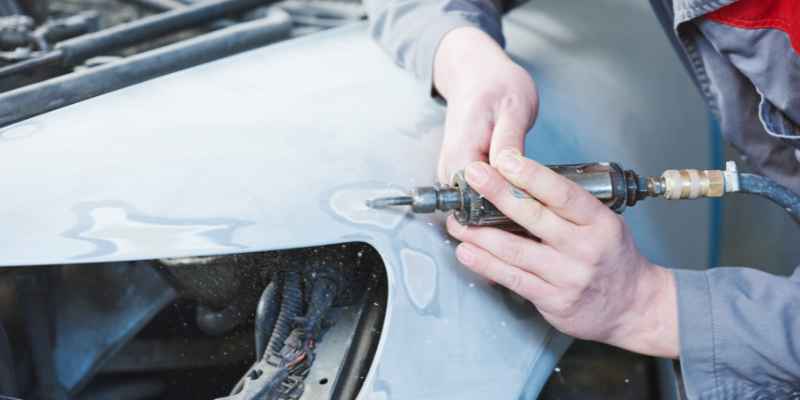
Frequently Asked Questions
What Is The Most Common Type Of Auto Repair Shop?
The most common type of auto repair shop is independent garages, which are privately owned and offer varying services and prices.
What Is Another Name For A Car Repair Shop?
Another name for a car repair shop is an automobile repair shop, garage, or workshop.
What Is The Difference Between Auto Maintenance And Repair?
Auto maintenance involves routine services to keep the car running smoothly, while repair addresses specific issues or damages. Maintenance prevents problems, while repair fixes existing ones. Both are essential for vehicle longevity and performance.
What Is A Car Body Shop?
A car body shop is where vehicle bodywork is built or repaired by skilled technicians.
Conclusion
When it comes to deciding between an auto repair shop and a body shop, it’s important to understand the differences between the two. Auto repair shops focus on fixing mechanical issues and worn out parts, while body shops specialize in repairing the body and exterior of the vehicle.
Depending on the type of damage your vehicle has sustained, you may need to visit both types of shops. Ultimately, choosing the right shop for your needs will ensure that your vehicle is properly repaired and back on the road in no time.

